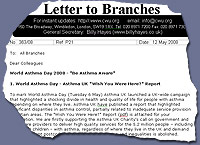 The CWU have announced that they are fully supporting the Asthma UK Charity's call on government and healthcare providers to deliver high quality services for the 5.2 million people – including 1.1 million children - with asthma, regardless of where they live in the UK and demand that the current postcode lottery of service provision and inequalities is abolished.
The CWU have announced that they are fully supporting the Asthma UK Charity's call on government and healthcare providers to deliver high quality services for the 5.2 million people – including 1.1 million children - with asthma, regardless of where they live in the UK and demand that the current postcode lottery of service provision and inequalities is abolished.
The UK has one of the highest rates of people with asthma of any country in the world, many sufferers living with symptoms unnecessarily. This is due to the disparity of treatment across the UK and the cost of prescriptions for asthma management required by those with the life threatening condition.
At an average cost of at least £14.20 per month, based on current prescription charge of £7.10, just for the two basic asthma inhalers used to control Asthma, having it is not cheap!
For the majority this means for life and without their medication, the risk of death from an Asthma attack becomes greater and is something they cannot afford to face.
Government figures show that 5.2 million people in the UK are currently receiving treatment for asthma, the majority of whom are paying for their prescriptions. Taking just the estimated 2.6 million of severe suffers, that is an estimated income to the treasury of over £458 million per annum. Because of the nature of the illness and currently there is no cure for the condition, that is a guaranteed minimum annual sum!
 Asthma is very much misunderstood, especially by those not suffering from it.
Asthma is very much misunderstood, especially by those not suffering from it.
One minute an attack can cause severe breathing difficulties, inability to walk, and even the inability to speak in many severe cases.
The next, following the use of their medication, thankfully most sufferers fully recover from the attack and carry on their business as normal.
To the outside world, the average asthma sufferer shows no sign of this debilitating illness, and it is often difficult for non-sufferers to know how to react when someone in their company suddenly goes through an Asthma attack.
These are the shocking figures according to Asthma UK research based on government figures:
-
There were just over 1,300 deaths (1,318) from asthma in the UK in 2005 (27 were children aged 14 years or under). On average, 4 people per day or 1 person every 7 hours dies from asthma.
-
There are 4.1 million adults with asthma in the UK.
-
For more than half 2.6 million – the reality is serious symptoms, including debilitating breathlessness, attacks so bad they cannot speak, fear that they may die, and emergency hospital admissions.
According to Asthma UK, 43% of people with asthma report that their condition can get in the way of them doing their job and more than 18 million working days are lost to asthma each year.
They asked employees with asthma if things at work made their asthma worse - 40% said 'yes' and these are the things they blamed:
The organisation say that with 18 million lost working days every year, the impact of asthma on the economy and the NHS is significant:
• Difficult to control asthma costs the NHS around £680 million a year.
• The cost of treating a person who is having an asthma attack is 3.5 times more than treating someone whose asthma is well managed.
• Emergency hospital admissions for asthma cost the NHS more than £45.8 million a year.
• It is estimated that 80% of expenditure on asthma goes on the 20% of people whose asthma is more severe.
In LTB363/08 issued to all CWU Branches, Dave Joyce, National Health, Safety & Environment Officer, highlights World Asthma Day 2008, held on 6th May this year, and Asthma UK’s published report - "Wish You Were Here?"
The report identifies significant disparities in asthma control, partially related to inadequate service provision in certain areas.
 Dave says, “Asthma is a debilitating and potentially life-threatening condition for sufferers, but it’s often forgotten about. Many of us will not know which of our colleagues have asthma and many of us would know what to do if a colleague suddenly suffered an attack.”
Dave says, “Asthma is a debilitating and potentially life-threatening condition for sufferers, but it’s often forgotten about. Many of us will not know which of our colleagues have asthma and many of us would know what to do if a colleague suddenly suffered an attack.”
Asthma UK’s report shows that in England, the region with the highest emergency admissions for children’s asthma is the North-West. Topping the list for the PCT with the highest emergency admissions is Liverpool PCT, whose figures are eight times higher than those of Richmond & Twickenham PCT, with the lowest emergency admissions in the country.
Neil Churchill, Chief Executive of Asthma UK says:
"These figures paint a disturbing picture of the impact of asthma on children’s lives, suggesting that not all children are getting the same access to vital asthma services, such as a local specialist asthma nurse. These divisions are unacceptable, particularly the staggering eight-fold difference in admissions in England.
 If asthma is not controlled effectively, the effects can be devastating and in some cases fatal, which is why reducing the hospital admissions of people with asthma is a key aim for Asthma UK.
If asthma is not controlled effectively, the effects can be devastating and in some cases fatal, which is why reducing the hospital admissions of people with asthma is a key aim for Asthma UK.
Our campaign must act as a wake-up call to health services and governments about the costs and consequences of unnecessary hospital admissions."
Dave Joyce further advises in his LTB that the CWU is joining with the Institution of Occupational Safety and Health (IOSH) in calling on bosses and workers to be asthma-aware this month.
Dave points out: “Occupational asthma continues to be a major issue in the workplace, costing 18 million working days each year. Over the course of a decade, this is estimated to cost £1.1 billion. The Health and Safety Executive (HSE) estimates between 1,500 and 3,000 people develop occupational asthma each year, rising to 7,000 if you include the number of people who suffer asthma made worse by their work.”
Asthma is something we all need to be more aware is the strong message of the letter to branches.
Dave gives this advice: “Asthma sufferers should be encouraged to make colleagues aware of their condition, and if they’re doing something that might trigger an attack make them aware of this also. Exposure to dust, fumes or excess stress can develop asthma. Asthmatics that work in highly susceptible jobs should make sure that the employer protects them properly from things that could trigger an attack.”
The LTB issued to all CWU branches included several documents available from Asthma UK’s website. These can be downloaded for speed, direct from this site:
World Asthma Day '08 Report
Asthma Review Card (English)
Asthma Review Card (Welsh)
Asthma UK website
Source: CWU / Asthma UK